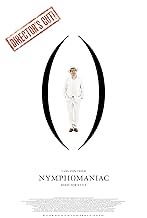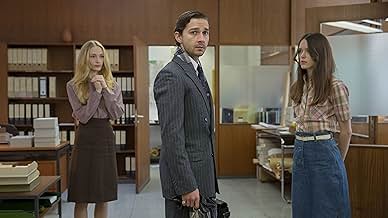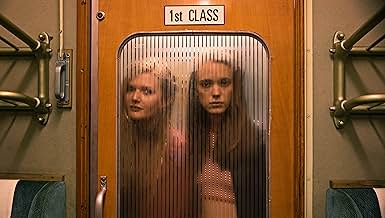Une nymphomane auto-diagnostiquée raconte ses expériences érotiques à l'homme qui l'a sauvée d'une bastonnade.Une nymphomane auto-diagnostiquée raconte ses expériences érotiques à l'homme qui l'a sauvée d'une bastonnade.Une nymphomane auto-diagnostiquée raconte ses expériences érotiques à l'homme qui l'a sauvée d'une bastonnade.
- Réalisation
- Scénario
- Casting principal
- Récompenses
- 17 victoires et 30 nominations au total
Charlie G. Hawkins
- Young Lad 2 on Train
- (as Charlie Hawkins)
Avis à la une
Denmark's notorious infant terrible, who used despair and unflinching self-mutilation as his canvas in his last few films, had already sparked a great deal of controversy and intrigue when the title of his next venture was announced. Nymphomaniac would deal with the bare-it-all, spare-no-details chronicle of a woman's sexual awakening, adventuring, and ultimate degradation. Lars von Trier, who some have accused of misogyny and making movies purely to shock, caught a good bit of flak for daring to make a movie that can be considered a woman's sexual autobiography, and most expected it to be a truly explicit film that could be considered little more than pornography.
Most people underestimate Lars von Trier. While he does have his peculiarities, he is first and foremost an artist. And Nymphomaniac, his third outing with his muse Charlotte Gainsbourg, is perhaps his most expansive work to date. Split into two films and covering several decades, von Trier has concocted a Homeric tale of sound and fury and all sorts of sexual depravity. But this film is not designed to arouse, to titillate. Far from it; the sex is clinical, detached, almost boring at times.
As I said, this is a woman's odyssey. This woman is Joe (Gainsbourg), who is discovered beaten within an inch of her life in a back alley by a lonely bachelor named Seligman (Stellan Skarsgard). Joe demands Seligman not call for assistance, instead accompanying the man back to his apartment for a cup of tea. And after she gets patched up, Joe finds Seligman a willing listener, a father confessor of sorts, and begins to spin a tale of promiscuity that would drive most men wild but intrigues Seligman in a much more philosophical manner. Joe's story starts from her discovery of her own sexuality at the age of two, and by the time she came to barely legal age (here played by Stacy Martin) and how she begins exploring her hypersensual nature. She abandons her virginity by bedding a motorhead (a curiously accented Shia LaBeouf), then even playing games of one-upmanship with her best friend and fellow sex addict (one scene features the girls competing to see who can bang the most guys on a train to win a bag of chocolates). As Gainsbourg's present-day Joe explains herself, Seligman picks out details and compares her sexual deviancy to the most obscure things, from fishing lures to baroque tritones. Von Trier is a very distinct writer, always seeming to verge on the arcane in his observations on the human condition, and here he gives an interesting perversion on, well, perversion. Is Seligman a truly insightful man when it comes to the human condition, or is he just the most hopelessly awkward fool imaginable?
While Gainsbourg brings a great deal of gravitas to the role, it is her most subdued of the three films she's done with von Trier. And yet it is her most accessible, and she narrates the events of the film with such matter-of-fact certainty, her throaty voice describing the life she's led with all of the care and calm of a woman describing the weather. But in the first half of the saga's four-hour run time, it is Stacy Martin who does the heavy lifting, and she does it with remarkable skill, carefully balancing between naiveté and calculation. As Joe matures and sinks further into her addiction (a term she despises), more and more familiar faces start showing up. Her parents are briefly played by Christian Slater and Connie Nielsen, the former having an excellent "money scene" while the latter has maybe thirty seconds of screen time. Shia LaBeouf, who zigzags between admirable and awkward (sometimes in the course of the same scene), returns as Joe's first employer and ultimately her husband. And mention must be made of Uma Thurman's haughtily fiery scene-stealer of a performance that blazes on-screen as a jilted wife whose husband has abandoned her for what he expected to be a life with Joe. She follows her husband to Joe's apartment with their three tykes in tow, and in the span of seven minutes she frays and has a complete emotional meltdown.
As the first half of the film segues in to the second, Gainsbourg takes the fore, as Joe stops seeking sexual release for joy and instead out of a desperate need to feel something. As the film goes on, she explores different fetishes and outlets, including but not limited to interracial threesomes, bondage, humiliation of all sorts. In one notable case, Gainsbourg's character submits herself to the whims of a young man who specializes in intense BDSM. The fact that this rather devious fellow is played by Jamie Bell is a bit of a shock to anyone who's seen Billy Elliot recently. But if anyone was stimulated by the first act of Joe's saga, the second act dashes it away with cold realism.
As with all of von Trier's films, the ending is unforgettable. I confess that when I sensed the film drawing to a close, I was pleasantly surprised at how von Trier handled it, and that perhaps the Danish prince of melancholia had decided to serve up a happy ending for once. Of course, I forgot this is Lars von Trier we're talking about, and the final minute of the film may send audience members in a tizzy. It's part of the reason why I've taken so long to write my thoughts on it. But as I write this, I do think Nymphomaniac is a terrific entry in his canon, and a worthy closer to his trilogy.
Most people underestimate Lars von Trier. While he does have his peculiarities, he is first and foremost an artist. And Nymphomaniac, his third outing with his muse Charlotte Gainsbourg, is perhaps his most expansive work to date. Split into two films and covering several decades, von Trier has concocted a Homeric tale of sound and fury and all sorts of sexual depravity. But this film is not designed to arouse, to titillate. Far from it; the sex is clinical, detached, almost boring at times.
As I said, this is a woman's odyssey. This woman is Joe (Gainsbourg), who is discovered beaten within an inch of her life in a back alley by a lonely bachelor named Seligman (Stellan Skarsgard). Joe demands Seligman not call for assistance, instead accompanying the man back to his apartment for a cup of tea. And after she gets patched up, Joe finds Seligman a willing listener, a father confessor of sorts, and begins to spin a tale of promiscuity that would drive most men wild but intrigues Seligman in a much more philosophical manner. Joe's story starts from her discovery of her own sexuality at the age of two, and by the time she came to barely legal age (here played by Stacy Martin) and how she begins exploring her hypersensual nature. She abandons her virginity by bedding a motorhead (a curiously accented Shia LaBeouf), then even playing games of one-upmanship with her best friend and fellow sex addict (one scene features the girls competing to see who can bang the most guys on a train to win a bag of chocolates). As Gainsbourg's present-day Joe explains herself, Seligman picks out details and compares her sexual deviancy to the most obscure things, from fishing lures to baroque tritones. Von Trier is a very distinct writer, always seeming to verge on the arcane in his observations on the human condition, and here he gives an interesting perversion on, well, perversion. Is Seligman a truly insightful man when it comes to the human condition, or is he just the most hopelessly awkward fool imaginable?
While Gainsbourg brings a great deal of gravitas to the role, it is her most subdued of the three films she's done with von Trier. And yet it is her most accessible, and she narrates the events of the film with such matter-of-fact certainty, her throaty voice describing the life she's led with all of the care and calm of a woman describing the weather. But in the first half of the saga's four-hour run time, it is Stacy Martin who does the heavy lifting, and she does it with remarkable skill, carefully balancing between naiveté and calculation. As Joe matures and sinks further into her addiction (a term she despises), more and more familiar faces start showing up. Her parents are briefly played by Christian Slater and Connie Nielsen, the former having an excellent "money scene" while the latter has maybe thirty seconds of screen time. Shia LaBeouf, who zigzags between admirable and awkward (sometimes in the course of the same scene), returns as Joe's first employer and ultimately her husband. And mention must be made of Uma Thurman's haughtily fiery scene-stealer of a performance that blazes on-screen as a jilted wife whose husband has abandoned her for what he expected to be a life with Joe. She follows her husband to Joe's apartment with their three tykes in tow, and in the span of seven minutes she frays and has a complete emotional meltdown.
As the first half of the film segues in to the second, Gainsbourg takes the fore, as Joe stops seeking sexual release for joy and instead out of a desperate need to feel something. As the film goes on, she explores different fetishes and outlets, including but not limited to interracial threesomes, bondage, humiliation of all sorts. In one notable case, Gainsbourg's character submits herself to the whims of a young man who specializes in intense BDSM. The fact that this rather devious fellow is played by Jamie Bell is a bit of a shock to anyone who's seen Billy Elliot recently. But if anyone was stimulated by the first act of Joe's saga, the second act dashes it away with cold realism.
As with all of von Trier's films, the ending is unforgettable. I confess that when I sensed the film drawing to a close, I was pleasantly surprised at how von Trier handled it, and that perhaps the Danish prince of melancholia had decided to serve up a happy ending for once. Of course, I forgot this is Lars von Trier we're talking about, and the final minute of the film may send audience members in a tizzy. It's part of the reason why I've taken so long to write my thoughts on it. But as I write this, I do think Nymphomaniac is a terrific entry in his canon, and a worthy closer to his trilogy.
this film has only one flaw - its not long enough... its funny and brilliant, its dark and thrilling and its poetic at the same time. Whoever have watched any film by Trier won't be disappointed. Of course don't read previous reviews - this film is not about sex. Its about loneliness between sensations, about being alone among people who suffer from lack of attachment. Its about life that struggles with death by facing death , to the ultimate boundary of pleasure. Just watch it, listen to BACH music and observe the feast for eye and ear and a challenge for heart... Maybe my words seem exaggerated but i have finished watching this film just an hour ago and my impressions are strong. But i believe it will endure and i will take my feelings from this movie with me and carry them through my daydreams...
Nymphomaniac (2013)
[Director's Cut]
"Nymphomaniac" is the final part of Lars von Trier's "Trilogy of Depression", after the "Antichrist" (2009), which was to me inexplicably dull and unjustified morbid, and "Melancholy" (2011), which I have not yet come to see. Originally, "Nymphomaniac" was conceived as a single film but, due to its inhumane length, in the theatrical release, it was divided into two two-hour films. I am watching the director's cut, which lasts five and a half hours.
The first film begins with a scene in which an older man encounters a beaten woman lying on the street. After she refuses an ambulance and the police, he takes her to his apartment and places her in bed. Then he sits down next to her and she tells him her whole life, the life of a nymphomaniac. Occasionally he interrupts her with interesting comments on various topics, such as philosophy, nature, music, literature, mathematics and even fishing, but all these digressions are directly or metaphorically related to the main subject of the film and represent life philosophies that will lead you to thinking and self-analysis, especially if in some of them you recognize yourself.
The film is full of explicit pornography, but this time it is not there just to shock and cause controversy, but it greatly enhances the artistic power of film and contributes to the credibility and the dramatic nature of the story. The sex scenes are not simulated, they are genuine pornography, but they were shot by porn actors and subsequently edited together with the bodies of the main actors. The film is fantastically shot and directed, and drama and pornographic scenes alternate in perfect harmony. The atmosphere is hypnotically dark and depressing, additionally empowered with an interesting selection of music, which ranges from industrial metal band Rammstein, through rock classics, to Bach's organ compositions. Although the movie is very slow and long, my attention has not been weakened for a moment.
In all three films of the "Trilogy of Depression", Charlotte Gainsbourg plays the main role, but as the first part of the "Nymphomaniac" takes us through her childhood and girlhood, in the main role we see Stacy Martin, who, although not particularly beautiful, is extremely cute and sexual, and in every way a sight for sore eyes in comparison with Charlotte. Charlotte's rescuer is played by Stellan Skarsgård, who appears in a total of seven von Trier's films. There is also Christian Slater in the role of Nymphomaniac's father, as well as Uma Thurman, who gave perhaps the best performance in her career. Stacy, Charlotte, and Stellan topped their roles, but in her relatively short scene, Uma Thurman completely overshadowed them. Her scene is totally over the top, but still somehow realistic and believable. This somewhat relates to the film in its entirety, but Uma's scene is one of the most powerful I've ever seen. Ruthlessly awkward, strongly emotional and definitely unforgettable. Uma deserved an Oscar big as the Statue of Liberty.
There's still three hours of the second movie left for me to make a final judgment, but for now, this is a pure ten.
Seligman: "Well, I divide humanity into two groups: the people who cut the nails on the left hand first, and the people who cut the nails of the right hand first. My theory is that the people who cut the nails of the left hand first they're more light-hearted. They have a tendency to enjoy life more, because they go straight for the easiest task, and save the difficulties for later. So, what do you do?" Joe: "Always the left hand first. I don't think there's a choice. Go for the pleasure first, always. And then when you've done the left hand, only the right hand remains. That's the easiest one left." Seligman: "I never thought of it like that. Well, you're never too old. Never too old to learn."
10/10
"Nymphomaniac" is the final part of Lars von Trier's "Trilogy of Depression", after the "Antichrist" (2009), which was to me inexplicably dull and unjustified morbid, and "Melancholy" (2011), which I have not yet come to see. Originally, "Nymphomaniac" was conceived as a single film but, due to its inhumane length, in the theatrical release, it was divided into two two-hour films. I am watching the director's cut, which lasts five and a half hours.
The first film begins with a scene in which an older man encounters a beaten woman lying on the street. After she refuses an ambulance and the police, he takes her to his apartment and places her in bed. Then he sits down next to her and she tells him her whole life, the life of a nymphomaniac. Occasionally he interrupts her with interesting comments on various topics, such as philosophy, nature, music, literature, mathematics and even fishing, but all these digressions are directly or metaphorically related to the main subject of the film and represent life philosophies that will lead you to thinking and self-analysis, especially if in some of them you recognize yourself.
The film is full of explicit pornography, but this time it is not there just to shock and cause controversy, but it greatly enhances the artistic power of film and contributes to the credibility and the dramatic nature of the story. The sex scenes are not simulated, they are genuine pornography, but they were shot by porn actors and subsequently edited together with the bodies of the main actors. The film is fantastically shot and directed, and drama and pornographic scenes alternate in perfect harmony. The atmosphere is hypnotically dark and depressing, additionally empowered with an interesting selection of music, which ranges from industrial metal band Rammstein, through rock classics, to Bach's organ compositions. Although the movie is very slow and long, my attention has not been weakened for a moment.
In all three films of the "Trilogy of Depression", Charlotte Gainsbourg plays the main role, but as the first part of the "Nymphomaniac" takes us through her childhood and girlhood, in the main role we see Stacy Martin, who, although not particularly beautiful, is extremely cute and sexual, and in every way a sight for sore eyes in comparison with Charlotte. Charlotte's rescuer is played by Stellan Skarsgård, who appears in a total of seven von Trier's films. There is also Christian Slater in the role of Nymphomaniac's father, as well as Uma Thurman, who gave perhaps the best performance in her career. Stacy, Charlotte, and Stellan topped their roles, but in her relatively short scene, Uma Thurman completely overshadowed them. Her scene is totally over the top, but still somehow realistic and believable. This somewhat relates to the film in its entirety, but Uma's scene is one of the most powerful I've ever seen. Ruthlessly awkward, strongly emotional and definitely unforgettable. Uma deserved an Oscar big as the Statue of Liberty.
There's still three hours of the second movie left for me to make a final judgment, but for now, this is a pure ten.
Seligman: "Well, I divide humanity into two groups: the people who cut the nails on the left hand first, and the people who cut the nails of the right hand first. My theory is that the people who cut the nails of the left hand first they're more light-hearted. They have a tendency to enjoy life more, because they go straight for the easiest task, and save the difficulties for later. So, what do you do?" Joe: "Always the left hand first. I don't think there's a choice. Go for the pleasure first, always. And then when you've done the left hand, only the right hand remains. That's the easiest one left." Seligman: "I never thought of it like that. Well, you're never too old. Never too old to learn."
10/10
All the one star reviews on this website that are calling the film a "porn documentary" are obviously written by a group of religious nuts offended by intellectualism and sexuality. Ignore them.
Von Trier has crafted what may be his magnum opus. He goes further into his often explored themes of suffering, femininity and the breaking of social norms. Indeed, this may be one of the most intense inquisitions into the female mind ever put to film. And it has a refreshingly feminist, sex positive tonal undercurrent. The drama really gets going in the second volume which I enjoyed much more than the first. Incredible acting from all involved but Jamie Bell, Charlotte Gainsbourg and Uma Thurman especially. For anyone cultured there is nothing outrageous or controversial here, just a solid thought provoking film from a master of the art form.
Von Trier has crafted what may be his magnum opus. He goes further into his often explored themes of suffering, femininity and the breaking of social norms. Indeed, this may be one of the most intense inquisitions into the female mind ever put to film. And it has a refreshingly feminist, sex positive tonal undercurrent. The drama really gets going in the second volume which I enjoyed much more than the first. Incredible acting from all involved but Jamie Bell, Charlotte Gainsbourg and Uma Thurman especially. For anyone cultured there is nothing outrageous or controversial here, just a solid thought provoking film from a master of the art form.
10dtane10
This is the best movie I've seen from Lars Von Trier. Brilliantly constructed, well directed, with lot of imagination and using many techniques (although I'm not a specialist). I include in my review the volume II as well. After watching the first one, yesterday, didn't have patience for see the second part. The idea of a Sheherezada tail, nowadays, makes the background. I loved the way the chapters telling Joe's life are separated by the intermezzos: her dialogs with Seligman, his erudition, her intelligence shadowed only by the all pervasive guilt feeling... I found the explicit key of the movie in the second part... in one of their dialogs. I try to remember it, it might not be 100% accurate: "Do you know what is characterizing our age? - Hypocrisy! People who tell beautiful lies are acclaimed and accepted, they form the majority; the few ones who tell the truth, often uncomfortable, are rejected!" Von Trier plays with two opposite characters: a nymphomaniac (probably more a being desperate to understand life meaning and get out of the beaten track than anything else), who never finds happiness in her search, so she goes further and further, and a 60 years old virgin who lives alone and finds his happiness in books. He plays as well with religion, with the concepts of purity and sin, with plenty of symbols amassed cleverly together. He shows us, in fact, our obsession with sex, with human bodies, with chair, making fun of the ones who will refuse his movie, scandalized. In our world which sells mainly with the help of sex, rejecting this movie is a huge hypocrisy. The only disappointment for me was the end of the second part... I don't see why he chose it, but probably will find later on the answer.
Le saviez-vous
- AnecdotesShia LaBeouf was asked to send pictures of his penis in order to obtain his role. He subsequently decided to send in personal tapes of him and his girlfriend having sex in order to convince Lars von Trier to cast him.
- GaffesThe train carriage where the two girls pick up strangers is German, but the ticket collector is wearing a British Railways uniform from the 1970s.
- Crédits fousNear the very end of the credits there is this disclaimer: "None of the professional actors had penetrative sexual intercourse and all such scenes where [sic] performed by body doubles."
- Versions alternativesThe director's cut adds roughly 28 minutes of footage, expanding some of the subplots.
- ConnexionsFeatured in Film '72: Épisode datant du 19 février 2014 (2014)
- Bandes originalesFühre mich
Performed by Rammstein
Written by Oliver Riedel, Christoph Schneider (as Christoph Doom Schneider), Richard Kruspe (as Richard Z Kruspe), Paul Landers, Till Lindemann and Flake Lorenz (as Doktor Christian Lorenz)
Meilleurs choix
Connectez-vous pour évaluer et suivre la liste de favoris afin de recevoir des recommandations personnalisées
Détails
- Date de sortie
- Pays d’origine
- Sites officiels
- Langue
- Aussi connu sous le nom de
- Ninfomanía (vol. 1)
- Lieux de tournage
- Sociétés de production
- Voir plus de crédits d'entreprise sur IMDbPro
Box-office
- Budget
- 4 700 000 $US (estimé)
- Montant brut aux États-Unis et au Canada
- 785 896 $US
- Week-end de sortie aux États-Unis et au Canada
- 158 369 $US
- 23 mars 2014
- Montant brut mondial
- 13 269 941 $US
- Durée1 heure 57 minutes
- Couleur
- Rapport de forme
- 2.35 : 1
Contribuer à cette page
Suggérer une modification ou ajouter du contenu manquant







































